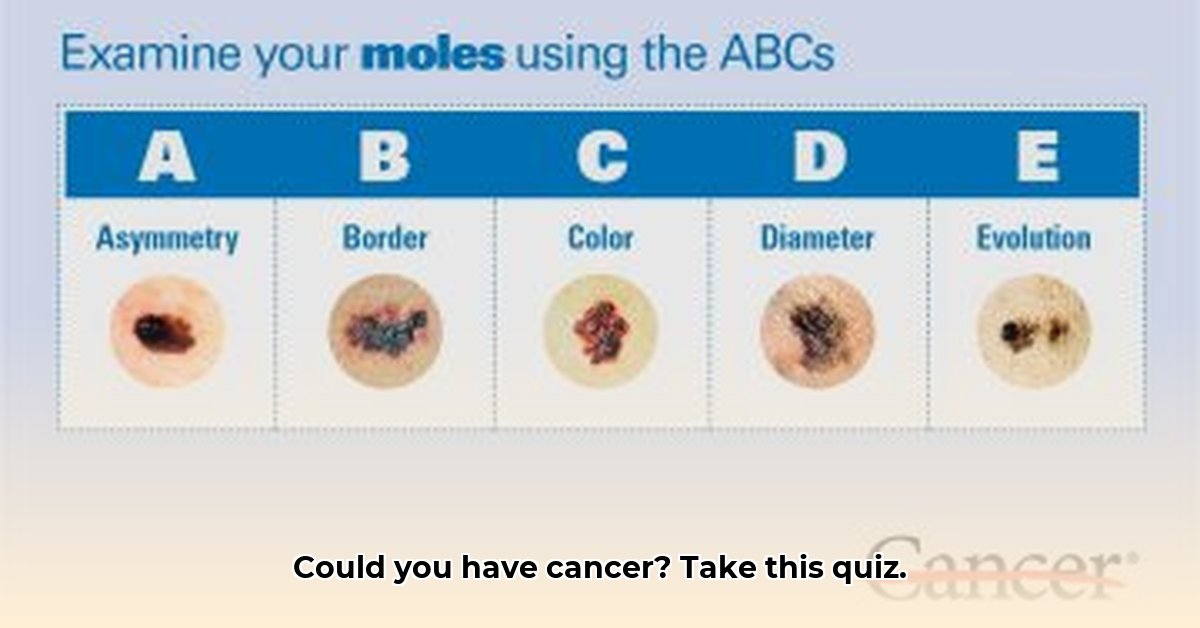Worried about cancer? It’s a natural concern. While online quizzes can be tempting, they’re not a substitute for professional medical advice. For more on medical imaging and cancer detection, see [this helpful resource](https://chaztin.com/can-a-dexa-scan-show-cancer/). This guide provides the facts and tools to understand your body and know when to seek help. We’ll cover early warning signs, self-checks, and why symptom checkers fall short. Our goal is to empower you with knowledge, not fear, so you can take proactive steps for your health.
Evaluating Cancer Risk Factors and Early Detection
Discovering a lump, feeling constantly tired, or noticing unusual changes can be alarming. The internet offers many “do I have cancer?” quizzes, but can they truly tell you if you have cancer? The answer is no, but we’ll explain what these quizzes can do and, more importantly, what you should do.
The Limitations of Online Cancer Quizzes
Online cancer quizzes offer a seemingly simple way to check for potential problems. However, they are not a replacement for a medical examination. Think of them as conversation starters, not definitive diagnoses. A positive result doesn’t guarantee cancer, and a negative result doesn’t mean you’re in the clear. Remember, these tools cannot diagnose cancer; they are a starting point. If a quiz expresses concern, consult your physician or qualified healthcare provider for medical advice.
Key Early Cancer Warning Signs
Many cancers develop subtly, highlighting the importance of early detection. Identifying cancer early significantly increases the chances of successful treatment. The following, while not definitive signs, require attention and discussion with your doctor:
-
Unexplained Weight Loss: Significant, unintentional weight loss without changes in diet or exercise habits can be a concern.
-
Persistent Fatigue: Excessive tiredness that goes beyond normal fatigue, even with rest, warrants medical evaluation.
-
Changes in Bowel or Bladder Habits: Ongoing constipation, diarrhea, changes in frequency, blood in urine or stool, or any other unusual changes should be discussed with your doctor.
-
Persistent Pain: Unexplained, lingering pain, especially if worsening, requires medical attention.
-
Skin Changes: Monitor moles, sores, or other skin changes. New moles, changes in size or color of existing moles, or non-healing sores should be evaluated.
These symptoms can be caused by many factors unrelated to cancer. Nevertheless, they warrant professional medical evaluation to rule out any serious underlying causes.
Taking Proactive Steps for Cancer Prevention
Don’t let fear keep you from taking control of your health. Here’s what you can do:
1. Regular Self-Exams: Learn how to perform regular breast and testicular self-exams. Many online resources offer detailed instructions and visual aids. Early detection is crucial, even if something feels “off.”
2. Symptom Tracking: Keep a record of any unusual symptoms, including when they started, how long they’ve lasted, and their severity. This information is valuable for your doctor.
3. Consult Your Doctor: Schedule an appointment with your doctor if you notice anything persistent or concerning. Your doctor can evaluate symptoms, order tests, and provide a proper diagnosis. Online quizzes are not a substitute for professional medical advice.
4. Reliable Information: Rely on reputable sources like the National Cancer Institute, the American Cancer Society, the Mayo Clinic, or the CDC for trustworthy information about cancer. Avoid unreliable websites or forums that may spread inaccurate information.
Navigating Uncertainties in Cancer Concerns
While symptoms like blood in your stool or urine are strong indicators for immediate medical attention, many other symptoms are less clear. The duration a symptom persists before causing concern varies depending on cancer type and individual factors.
This ambiguity underscores the importance of consulting a medical professional. Your doctor interprets your symptoms in context, considering your risk factors and medical history.
When is a Doctor’s Visit Essential for Cancer Evaluation?
Schedule a doctor’s appointment without delay in these situations:
-
Persistent Symptoms: Any symptom lasting more than a few weeks should be evaluated.
-
Unexplained Weight Loss: Significant, unexplained weight loss requires a thorough examination.
-
Altered Bowel or Bladder Habits: Noticeable changes in bowel movements or urination frequency or consistency should be addressed.
-
Suspicious Skin Lesions: Changes in existing moles or new skin lesions require professional evaluation.
-
Chronic, Unexplained Pain: Persistent pain despite home remedies or over-the-counter pain relievers needs medical attention.
Your doctor can conduct a thorough examination, order necessary tests, and offer a precise diagnosis, which is essential for managing your health.
Reliable Sources of Cancer Information
Early detection increases your chances of successful treatment. Utilize this guide to become more informed and proactive about your health, but remember that your doctor is your primary resource. Don’t rely solely on online quizzes for something as serious and variable as cancer. Seek professional medical advice from a qualified healthcare provider for specific concerns. If you think you may have a medical emergency, immediately call your doctor or 911.
How Long Should Symptoms Persist Before Seeking Medical Advice?
Anxiety about persistent symptoms is understandable. We’ll discuss when to seek professional help. Online quizzes are not a substitute for a doctor’s evaluation. Early detection is essential.
Key Points:
- Many cancers share common early warning signs. Seek screening advice.
- Regular screenings are crucial based on age and risk factors.
- Self-exams are beneficial, but not a replacement for professional checkups.
- Obtain information from reputable sources, not just online quizzes.
Understanding Early Cancer Warning Signs
Early cancer signs can be subtle and easily overlooked, often mimicking less serious conditions. These include unexplained weight loss, persistent fatigue, chronic pain, unusual bleeding or discharge, skin changes, persistent cough or hoarseness, and digestive issues. Don’t dismiss these as minor ailments. Seek medical advice if they persist.
Proactive Steps Against Cancer Risks
-
Self-Assessment: Perform regular self-exams. Familiarize yourself with proper techniques for breast and testicular self-exams using trusted online resources.
-
Symptom Tracking: Maintain a detailed record of concerning symptoms, noting their onset, duration, severity, and any related factors.
-
Medical Consultation: Schedule an appointment with your doctor if you experience any persistent, unusual, or worrying symptoms. Early detection is your best defense.
-
Reliable Information: Rely on trustworthy sources such as the American Cancer Society or the Mayo Clinic for accurate information. Avoid unreliable online quizzes.
Addressing Uncertainties
Online symptom checkers cannot diagnose cancer. The symptoms above are common, but not exclusive to cancer. Your doctor considers your medical history and performs tests for a diagnosis. Address anxiety by seeking professional care.
Cancer Risk Factors and Prevention
Factors that increase cancer risk include age, family history, genetics, lifestyle (diet, exercise, smoking), and environmental exposures. While some factors are uncontrollable, maintaining a healthy lifestyle reduces overall risk.
American Cancer Society: Questions to Ask Your Doctor about Cancer Screening
- Stainless Steel Food Storage for Healthier, Eco-Friendly Meal Prep - February 27, 2026
- Stainless Food Containers Offer Durable Storage for Everyday Meals - February 26, 2026
- Stainless Steel Containers Offer Superior Food Preservation and Durability - February 25, 2026










